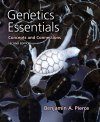![Genetics Essentials Genetics Essentials]()
Click to have a closer look
About this book
Contents
Biography
Related titles
About this book
Genetics Essentials: Concepts and Connections is the ideal brief text for helping students uncover the major concepts of genetics. Developed from Benjamin Pierce's acclaimed Genetics: A Conceptual Approach, this "essentials" text covers basic transmission, molecular, and population genetics in 18 streamlined, clearly illustrated chapters that emphasize the connections among key genetics ideas and the importance of developing solid problem-solving skills.
Contents
1. Introduction to Genetics
2. Chromosomes and Cellular Respirations
3. Basic Principles of Heredity
4. Extensions and Modifications of Basic Principles
5. Linkage, Recombination, and Eukaryotic Gene Mapping
6. Chromosome Variation
7. Bacterial and Viral Genetic Systems
8. DNA: The Chemical Nature of the Gene
9. DNA Replication and Recombination
10. From DNA to Proteins: Transcription and RNA Processing
11. From DNA to Proteins: Translation
12. Control of Gene Expression
13. Gene Mutations, Transposable Elements, and DNA Repair
14. Molecular Genetic Analysis and Biotechnology
15. Genomics and Proteomics
16. Cancer Genetics
17. Quantitative Genetics
18. Population and Evolutionary Genetics
Customer Reviews
Biography
Benjamin Pierce received a BS in Biology from Southern Methodist University and a PhD from the University of Colorado, USA. Ben is currently Professor of Biology and holder of the Lillian Nelson Pratt Chair at Southwestern University, Georgetown, TX. He is a population geneticist who conducts ecological and evolutionary research on amphibians. Ben has authored a number of articles in research journals and several books, including: The Family Genetics Sourcebook, a guide to genetics for the layperson; Genetics: A Conceptual Approach, a general genetics textbook; Genetics Essentials: Concepts and Connections, a brief genetics textbook; and Transmission and Population Genetics: A Short Course, a textbook for courses in transmission and population genetics. Ben is a member of the steering committee of the 21st Century Science Coalition, a group of scientists who support strong science standards for Texas public schools. He is the President of the Texas Academy of Science, is a member of Phi Beta Kappa and Sigma Xi, and is a Fellow of the Texas Academy of Science. He currently serves on the editorial board of Bioscience. He has received research and teaching grants from the Natural Science Foundation, the W. M. Keck Foundation, the 3M Foundation, the National Park Service, the Williamson County Conservation Foundation, and the National Geographic Society.



































